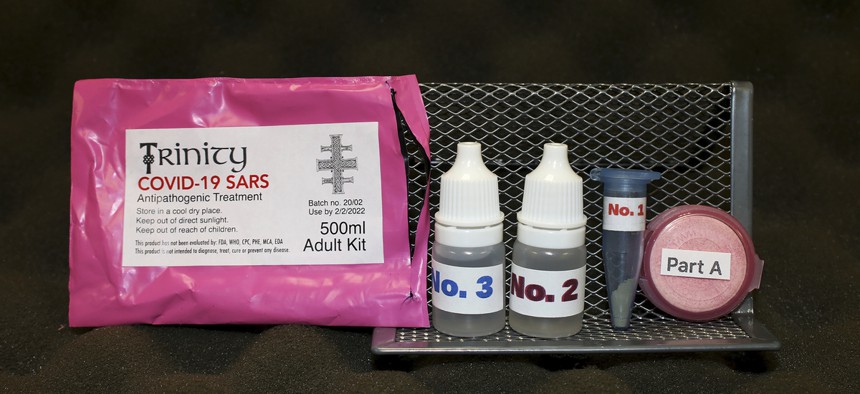State and Federal Prosecutors Target Bogus Cures and Treatment Scams

A scam "cure kit" obtained by federal prosecutors. U.S. Attorney's Office via AP
The coronavirus pandemic has led to an avalanche of products that are misleadingly marketed to make consumers believe they are effective treatments or prevention measures for the virus.
Though there are no legitimate at-home diagnostic tests, treatments, or remedies for coronavirus, the internet is currently flooded with ads for miracle creams, toothpastes, supplements and oils, all claiming to do just that. The scams have prompted state and federal law enforcement to warn consumers to be on alert and, in some cases, they’re also taking legal actions against the sellers.
On Wednesday, a federal court in Utah issued a temporary restraining order against companies in the state that prosecutors say were promoting fraudulent treatment and prevention products for Covid-19. A civil complaint brought against the companies alleges that they were making silver solutions that will “usher” coronavirus out of the bloodstream and “prevent the disease totally and completely.” A publicist for the companies told the Daily Beast his client, Gordon Pedersen, had only made statements “supported by scientific documents,” but the website for the products was later taken down.
Federal prosecutors say the companies in Utah aren’t the only ones trying to profit off the uncertainty and fear caused by the pandemic. Prosecutors also targeted alleged scams in Michigan, where a doctor was submitting fraudulent claims to Medicare for injections of vitamin C that he claimed would ward off the virus; in Texas, where they accused a wellness center of promoting “ozone therapy” for coronavirus patients; and in California, where a physician who ran a medical spa was charged in relation to the sale of Covid-19 “treatment packs” that guaranteed a “100% cure” for the price of $3,995.
At the state level, attorneys general have also taken action against what they described as an onslaught of scams. New York Attorney General Letitia James said that reports of fake cures have “overwhelmed” the state attorney general’s office since the pandemic started. In mid-March, James sent cease and desist letters to peddlers of fake silver solutions, as well as to Alex Jones, an influential conspiracy theorist who the office found was selling toothpaste, creams, and dietary supplements that he claimed could “kill” the coronavirus. After that letter, the New Yorker reported that Jones added a disclaimer to his website saying no products could treat diseases, including the coronavirus. James also sent a letter to Craigslist, asking the company to remove posts where sellers advertise “immunity packs” or at-home testing kits using images stolen from government websites.
Other states have followed New York’s lead. On Tuesday, Washington Attorney General Bob Ferguson sent a cease and desist letter to a Seattle-based biotech company that his office said was selling a $400 vaccine for coronavirus.
Ferguson cautioned that scammers use fear to “make you go against your better judgment” and that state law enforcement will have to “use all of the tools at our disposal to protect consumers during this public health emergency.”
In most cases, attorneys general are using standard consumer protection laws, which prevent businesses from fraudulently marketing their products or intentionally misleading consumers. In some states, however, law enforcement has devised new rules to specifically target medical scams related to coronavirus. In Oregon, the state created a temporary rule requiring companies to show scientific evidence to back up any claim that their product prevents, treats, or diagnoses Covid-19.
The attorney general’s office used the rule to warn a wellness store in Portland about a sandwich board outside its shop claiming that CBD, a derivative of marijuana, could boost immunity to the coronavirus. “Our message is simple,” Attorney General Ellen Rosenblum said. “There are no known cures for COVID-19. Please don’t try to sell something that suggests there are!”
Rosenblum is one of the many attorneys general turning to public education, hoping to get the message out there that, at this point, nothing purporting to be a cure or treatment is legitimate. “Has anybody tried to sell you a wellness product that can ‘cure’ the coronavirus or keep you healthy from the virus?” she wrote on Twitter. “Always ask yourself if the business has proof of their promotional claims or if the product has been approved by the [Food and Drug Administration].”
Michigan’s attorney general told consumers to watch out for “snake oil salesmen” offering things like supplements and essential oils as treatments, which he deemed “crap.” Similarly, U.S. Attorney Bryan Schroder in Alaska told residents in his state to employ suspicion when they hear of cure-all solutions. “If something seems too good to be true, it probably is,” he said. “If you’re being offered a cure when we know that there’s not any treatments out there that have been approved yet, or you’re being offered a test when we know those are being controlled by hospitals and medical professionals, chances are that’s some kind of scam.”
Others are targeting their messages to groups that might be particularly vulnerable to scams. Elderly people are more likely to be the target of certain scams, and may be also more susceptible to scammers’ claims. Arizona Attorney General Mark Brnovich issued a warning directed specifically to seniors, while also asking their families to “remain in regular phone contact with their parents, grandparents, and other seniors” to ensure their needs are met. “Con artists are calling and emailing consumers claiming to be from medical organizations that have a COVID-19 vaccination and require payments to buy a dose,” the warning reads. “There currently is NO vaccination for COVID-19 and there is NO proven product to cure the virus.”
Emma Coleman is the assistant editor for Route Fifty.
NEXT STORY: States Are Using the Pandemic to Roll Back Americans’ Rights






